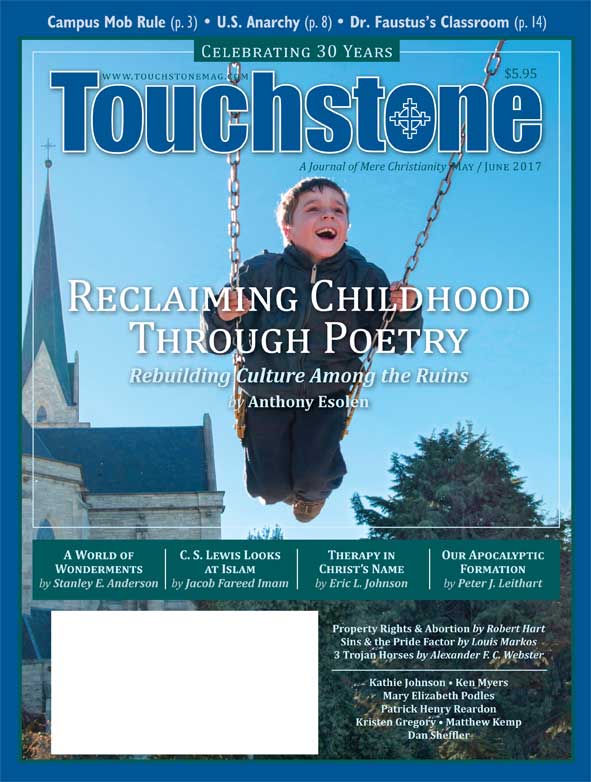Editorial
Campus Descent
Where Higher Ed Meets the Lower Regions
I am not usually fond of modern art or architecture, but I'll grant that the Vietnam War Memorial in Washington is effective in its solemn simplicity: a small rise of ground into which is set a long wall, extending the length of two acres. The wall features the names of the more than fifty-six thousand men who died in the war. There is a cobblestone promenade, for people to walk at their leisure and find the names of friends and loved ones who went down into those swamps of death and never returned.
Imagine someone taking a can of spray paint and defacing the wall with a slogan. Vandalism, of course. But I drive past a lot of vandalism on my way to work, on the sides of abandoned mills, bridges, warehouses, and retaining walls. It isn't good, but it doesn't make me grit my teeth with indignation. What makes that space, the space of the memorial, different? Even the three-dimensional secular man who aspires to the condition of a flatlander will sense it. The memorial ushers us into the presence of the ultimate things: life and death, suffering and heroism, memory and the full measure of devotion. The memorial presents itself as holy, set apart from common use.
I have never touched a monstrance. You should not play baseball in a cemetery. You do not doodle on the back of your father's funeral card. And you do not, on a college campus, take part in a mob, regardless of how well you comport yourselves as a mob, or how just your cause may be.
Mobs versus Congregations
Let me distinguish between a mob and a congregation. Imagine a Corpus Christi procession. The priest bears the sacrament, followed by worshipers singing the Pange, lingua, stopping at various places for prayer. The procession embraces young and old, men and women, made one in their common worship of the Lord who gave himself up for their salvation. They neither efface nor flaunt their individuality, nor slay it upon the altar of lust and violence. They forget it, as in a lesser key men set their grudges aside when they enter the marked-off territory of the ball field.
That does not mean that the worshipers warp or stifle their capacity to reason. As song is language straining upward, raised to its heights and even beyond, so reason refined of error and aimed toward the highest of its objects trembles upon the threshold of faith. Take someone aside from the procession and ask, "What are you celebrating?" You will see someone calm and peaceful, even if flushed with mirth or grave with the solemnity of the feast.
A mob is to a congregation as a "demonstration" is to a religious procession, as lust is to love, as shouting is to conversation, as wrath is to the hunger for righteousness, as the habituating force of vice is to the liberating habit of virtue. The mob chants a slogan; the people in a procession pray as their fathers did. The mob is sub-rational, and can turn a Socrates into a beast. The procession is supra-rational, and can make the most ordinary of mortals glow like an angel. The procession attracts, the mob appalls—and sometimes attracts precisely because it is appalling.
From Poor Show to Travesty
Consider, now, that a college is like a ball field for rational inquiry, conversation, and argument. Or rather that it is like a sanctuary, a place set aside for a holy purpose, not to be reduced to the practicalities of daily life, much less to political utility: the pursuit of truth for its own sake. What happens when you deface the campus with political demonstrations? You serve notice to all students and faculty that will and force, not reason, should dominate. You do not begin a discussion. You end it, or you ensure that no reasoned discussion will take place to begin with. You imply a threat of force against anyone who should dare, within class or without, to differ from what you have set down as what all right-thinking human beings must accept.
How destructive is this? There are sins, and there are sins. The pitcher who fails to keep himself in good condition serves up a cripple pitch, and the batter deposits it into the bleachers. The priest lets his mind wander and disappoints his parishioners by his inattention. The professor cobbles together an article from two or three sources but never bothers to consult the most important. These sinners fail by deficiency.
Anthony Esolen is Distinguished Professor of Humanities at Thales College and the author of over 30 books, including Real Music: A Guide to the Timeless Hymns of the Church (Tan, with a CD), Out of the Ashes: Rebuilding American Culture (Regnery), and The Hundredfold: Songs for the Lord (Ignatius). He has also translated Dante’s Divine Comedy (Random House) and, with his wife Debra, publishes the web magazine Word and Song (anthonyesolen.substack.com). He is a senior editor of Touchstone.
subscription options
Order
Print/Online Subscription

Get six issues (one year) of Touchstone PLUS full online access including pdf downloads for only $39.95. That's only $3.34 per month!
Order
Online Only
Subscription

Get a one-year full-access subscription to the Touchstone online archives for only $19.95. That's only $1.66 per month!
bulk subscriptions
Order Touchstone subscriptions in bulk and save $10 per sub! Each subscription includes 6 issues of Touchstone plus full online access to touchstonemag.com—including archives, videos, and pdf downloads of recent issues for only $29.95 each! Great for churches or study groups.
Transactions will be processed on a secure server.
more on education from the online archives
more from the online archives
calling all readers
Please Donate
"There are magazines worth reading but few worth saving . . . Touchstone is just such a magazine."
—Alice von Hildebrand
"Here we do not concede one square millimeter of territory to falsehood, folly, contemporary sentimentality, or fashion. We speak the truth, and let God be our judge. . . . Touchstone is the one committedly Christian conservative journal."
—Anthony Esolen, Touchstone senior editor















